#filed in the High Court
Text
ED के समन के खिलाफ HC में दाखिल CM हेमंत सोरेन की रिट पिटीशन पर सुनवाई छह अक्टूबर को
Ranchi: ईडी के समन के खिलाफ हाई कोर्ट में दाखिल मुख्यमंत्री हेमंत सोरेन की रिट पिटीशन पर छह अक्टूबर को सुनवाई होगी। याचिका पर सुनवाई चीफ जस्टिस संजय कुमार मिश्रा एवं जस्टिस आनंद सेन की खंडपीठ में होगी।
हेमंत सोरेन ने 23 सितंबर को झारखंड हाई कोर्ट में ईडी के समन के खिलाफ रिट पिटीशन दाखिल की है। दाखिल पिटीशन में डिफेक्ट था, जिसे दूर करने के लिए तीन अक्टूबर तक का समय दिया गया। पिटीशन में जो कमी थी…

View On WordPress
#against the ED summons#Chief Minister Hemant Soren&039;s writ petition#filed in the High Court#heard on October 6#JharkhandNews
0 notes
Text

a tag drop for rhys ♡
#( high lord of the night court : rhysand)#(of many stories: character file)#(face claim.)#( toni mahfud.)#(a court of thorn and roses rp)#(acotar rp)
7 notes
·
View notes
Text
#thrice convicted#see I knew it didn't make sense that an appeal wasn't filed following that drastic sentence reduction by the high court in january!#just because it wasn't reported on didn't mean it didn't happen#I was thinking about this case just a few nights ago and decided there was still time to hear from the supreme court#another month or two maybe#somewhat disappointed with the result though#all things considered it's just a slap on the wrist#seungri#soompi#burning sun
9 notes
·
View notes
Text
What is the IPC Section 482- The limitation period for Section 482 CrPC - Section 482 CrPC

Overview of IPC Section 482
Section 482 of the Indian Penal Code (IPC) deals with the offense of using a false property mark or designation. This section is crucial in protecting consumers from fraud and ensuring fair trade practices in the market. Understanding the intricacies of this section is essential for businesses and individuals to navigate the legal landscape effectively
Section 482 of the Indian Penal Code (IPC) deals with the offense of using a false property mark. Here is the text of IPC Section 482:
"Whoever marks any goods or any package or any covering or receptacle in which any goods are contained, with any mark, intending that such goods or any package or covering or receptacle shall thereby be believed to have been made, manufactured, packed or prepared by a person by whom or by whose order or in whose name or on whose behalf such goods are not really made, manufactured, packed or prepared, shall, unless he proves that he acted without intent to defraud, be punished with either kind of imprisonment for a maximum term of one year, with a fine, or with both."
In simpler terms, Section 482 of the IPC makes it an offense to use a false property mark on goods or their packaging with the intention to deceive others into believing that the goods were made or prepared by someone who did not actually make or prepare them. The offense carries a punishment of imprisonment for up to one year, a fine, or both, unless the accused can prove that they acted without intent to defraud.
Purpose and Scope of IPC Section 482
IPC Section 482 serves the vital purpose of safeguarding consumers by prohibiting the use of false property marks or designations. Its scope extends to various industries, including manufacturing, retail, and online commerce, where misrepresentation can deceive buyers and harm legitimate businesses. By understanding the intricacies of this provision, businesses can ensure compliance with the law and maintain their reputation in the market. Moreover, individuals need to be aware of their rights under this section to seek redress in case of fraudulent activities. It is crucial to explore the nuances of IPC Section 482 to uphold ethical business practices and protect consumer interests.
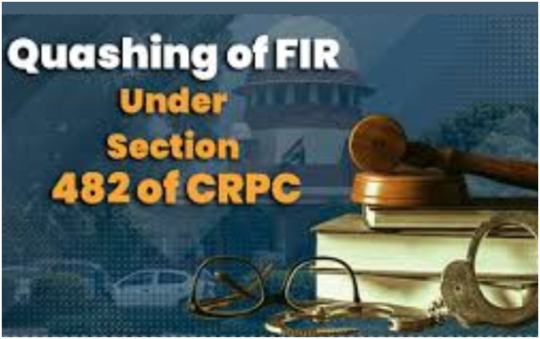
Role of the High Court in Quashing FIRs under IPC Section 482
High courts play a crucial role in administering justice under IPC Section 482 by evaluating petitions for quashing of FIRs. When a complaint lacks merit or is maliciously filed to harass an individual or business, the High Court can intervene to prevent an unjust prosecution. This discretionary power is exercised judiciously to protect innocent parties from legal persecution and uphold the integrity of the legal system. Understanding how the High Court interprets and applies IPC Section 482 is essential for both businesses and individuals to navigate legal challenges effectively and ensure justice prevails.
Conditions for invoking IPC Section 482
While the High Court has the authority to quash FIRs under IPC Section 482, certain conditions must be met for invoking this provision effectively. The primary consideration is whether there exists a dispute that falls within the purview of this section, such as lack of evidence or malicious intent. Additionally, the Court will assess if the quashing of the FIR serves the interest of justice and aligns with legal principles. Parties seeking relief under IPC Section 482 must demonstrate a genuine case for quashing the FIR, supported by compelling arguments and legal reasoning. Understanding these conditions is crucial for pursuing legal remedies effectively and ensuring fair outcomes in the justice system.
Recent Case Laws related to IPC Section 482
Staying abreast of recent case laws concerning IPC Section 482 is essential for legal practitioners to grasp the evolving interpretations and applications of this provision. Recent judgments shed light on the nuances of invoking Section 482, offering valuable insights into the factors considered by the courts when deciding on FIR quash petitions. By analyzing these cases, lawyers can glean strategic approaches and precedents to bolster their arguments and enhance the chances of success in similar petitions. Studying the outcomes of recent cases not only enriches legal understanding but also equips practitioners with the knowledge to navigate complexities in seeking relief under IPC Section 482 effectively.
IPC Section 482: Using False Property Mark

Definition of Offense:
Section 482 of the Indian Penal Code (IPC) deals with the offense of using a false property mark.
The term "property mark" refers to any mark, symbol, logo, or identification that signifies the origin, quality, or ownership of goods.
Elements of the Offense:
The offense under Section 482 involves marking goods, packages, coverings, or receptacles with a false property mark.
The act must be done with the intention to deceive others into believing that the goods were made, manufactured, packed, or prepared by a person or entity who did not actually make, manufacture, pack, or prepare them.
Intent to Defraud:
The key element in this offense is the intent to defraud. The accused must have knowingly and intentionally marked the goods with a false property mark with the intent to deceive others and gain an unfair advantage.
Punishment:
If found guilty under Section 482, the accused can be punished with imprisonment of either description for a term that may extend to one year.
Alternatively, the court may impose a fine, or both imprisonment and fine, depending on the circumstances of the case.
Burden of Proof:
In criminal cases, the burden of proof lies on the prosecution to establish beyond a reasonable doubt that the accused committed the offense.
However, in certain situations, the burden may shift to the accused to prove that they acted without intent to defraud, especially if there is evidence indicating fraudulent intent.
Examples of Offenses:
Using a counterfeit logo or trademark on products to mislead consumers about their origin or quality.
Falsely labeling goods with a certification mark to falsely claim compliance with quality standards.
Altering or tampering with serial numbers, batch codes, or other identifying marks to conceal the true identity of goods.
Legal Remedies:
Victims of offenses under Section 482 can seek legal remedies such as filing a criminal complaint with the police or initiating civil proceedings for damages.
Importance in Consumer Protection:
Section 482 plays a crucial role in protecting consumers from fraud and deception in the marketplace.
It helps maintain the integrity of property marks and ensures that consumers can trust the authenticity and quality of goods based on their markings.
Compliance and Enforcement:
Businesses and individuals must comply with the provisions of Section 482 to avoid legal consequences and uphold ethical standards in commercial practices.
Law enforcement agencies and regulatory authorities play a vital role in enforcing this provision and taking action against offenders.
Understanding IPC Section 482 is essential for businesses, manufacturers, traders, and consumers to uphold honesty, transparency, and fairness in trade practices and consumer transactions.
The limitation period for Section 482 CrPC
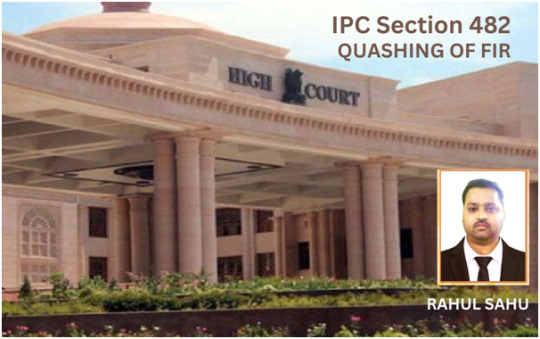
Section 482 of the Code of Criminal Procedure (CrPC) is not directly related to the limitation period. It pertains to the inherent powers of the High Court to quash FIRs (First Information Reports) or criminal proceedings. The limitation period for filing a complaint or initiating legal action under Section 482 CrPC is not explicitly defined within the section itself.
However, it's important to note that criminal offenses in India are subject to the provisions of the Limitation Act, 1963, which prescribes different limitation periods for various types of offenses. The limitation period is the maximum time within which legal action can be initiated after the commission of an offense.
For offenses under IPC Section 482 (i.e., using a false property mark), the specific limitation period would depend on the nature of the offense and the punishment prescribed under the IPC or relevant laws. Generally, for offenses punishable with imprisonment for up to one year, the limitation period is one year from the date of the offense.
It's advisable to consult with a legal expert or refer to the specific provisions of the Limitation Act and relevant laws to determine the exact limitation period applicable to offenses related to false property marks or other offenses covered under IPC Section 482.
Conclusion on the significance of IPC Section 482 in the Indian Legal System
In conclusion, the thorough examination of recent case laws regarding IPC Section 482 underscores its pivotal role in the Indian legal landscape. The nuanced interpretations provided by the judiciary offer valuable guidance to legal practitioners on the strategic utilization of this provision in seeking redressal. By assimilating insights from these rulings, lawyers can craft persuasive arguments and navigate the complexities inherent in FIR quash petitions more effectively. Understanding the evolving precedents under Section 482 not only enriches legal knowledge but also enhances practitioners' ability to secure favorable outcomes for their clients
Gets more information regarding CrPC 482 with advocate rahul sahu
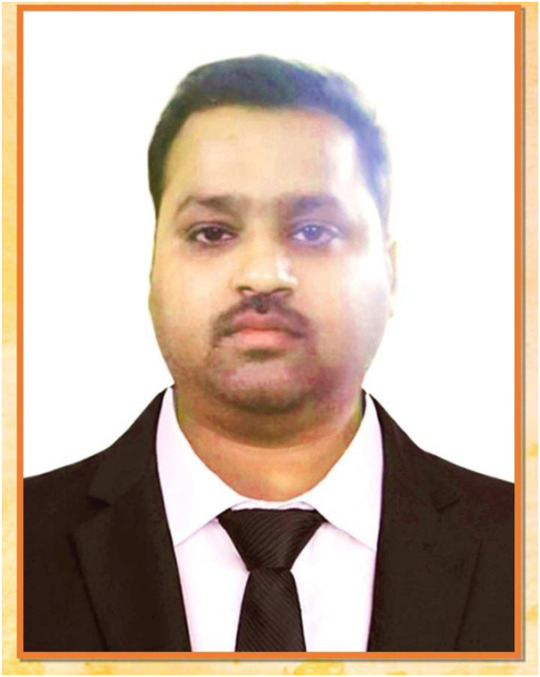
It's great to hear about Rahul Sahu's knowledge of IPC Section 482. Understanding legal provisions like Section 482 of the Code of Criminal Procedure (CrPC) is crucial, especially in matters related to using false property marks and related offenses. With a strong grasp of this section, Rahul Sahu can navigate legal complexities, provide valuable insights, and ensure compliance with relevant laws. It's commendable to have such expertise in legal matters!
Frequently asked questions
Here are some frequently asked questions (FAQs) about IPC Section 482, which deals with the offense of using a false property mark:
What is IPC Section 482?
IPC Section 482 deals with the offense of using a false property mark. It prohibits marking goods, packages, or receptacles with a false mark with the intent to deceive others regarding the origin, quality, or ownership of the goods.
What is a false property mark?
A false property mark refers to any mark, symbol, logo, or identification that is falsely applied to goods to mislead consumers about their origin, quality, or ownership. It includes counterfeit trademarks, altered serial numbers, and fake certification marks.
What constitutes an offense under Section 482?
To commit an offense under Section 482, one must mark goods with a false property mark with the intent to defraud. This involves knowingly and intentionally misleading others about the true nature or origin of the goods.
What is the punishment for violating Section 482?
The punishment for violating Section 482 can include imprisonment for up to one year, a fine, or both. The severity of the punishment depends on the circumstances of the case and the intent of the accused.
Who can file a complaint under Section 482?
Any person or entity affected by the offense under Section 482, such as consumers, competitors, or regulatory authorities, can file a complaint with the police or initiate legal proceedings against the accused.
What are some examples of offenses under Section 482?
Using counterfeit trademarks or logos on products.
Altering or tampering with serial numbers or batch codes.
Falsely claiming certification or quality marks on goods.
Is intent to defraud necessary to establish an offense under Section 482?
Yes, intent to defraud is a crucial element of the offense under Section 482. The accused must have knowingly and intentionally marked the goods with a false property mark with the intent to deceive others and gain an unfair advantage.
How can businesses ensure compliance with Section 482?
Businesses can ensure compliance with Section 482 by using genuine trademarks, labels, and certification marks on their products. They should also educate their employees about the importance of honesty and integrity in marketing practices.
What role do law enforcement agencies play in enforcing Section 482?
Law enforcement agencies, such as the police and regulatory authorities, are responsible for investigating complaints related to violations of Section 482 and taking legal action against offenders. They play a crucial role in maintaining fairness and transparency in trade practices.
CONTACT US
Email: [email protected]
Phone No : +91 7007598784
Our website: https://legaladvicekart.com/
#Property lawyer near me#Expert property lawyer near me#Best criminal lawyers in lucknow#Best advocate for family matters#Best family dispute lawyer in lucknow#Best advocate in Lucknow high court#Best lawyer in lucknow for divorce#Divorce lawyer in lucknow at best price#Best advocate in lucknow#Income tax lawyer in lucknow#Best tax lawyer near me#TDS return filing online in Lucknow#How to pay tds to income tax department#Section 482 CrPC#What is the IPC Section 482#limitation period for Section 482 CrPC
0 notes
Text
NYC Jails Flagrantly Deny Young People’s Legal Right To Education
New Court Filings Say That the City is Violating an Eight-Year-Old Court Order Mandating Access to Education for People Under 22.
— Akela Lacy | April 4, 2024

A View of the New York City Jails on Rikers Island, seen from a departing flight from LaGuardia Airport on Dec. 10, 2022, in Queens, N.Y. Photo: Andrew Lichtenstein/Corbis via Getty Images
Last June, New York City Mayor Eric Adams Spoke to Graduates at Rikers Island who received their high-school-equivalence diplomas while serving in jail.
“When you get your diplomas today,” Adams told the graduates, “I want you to stand up, lean back, be firm and strong and say, ��I got this. When does the hard part start? I’m finished with the hard part. Now I’m moving forward to my destiny on what I want to accomplish.’”
The group represented the successful fruits of a law that guarantees access to education to people incarcerated in city jails. The success stories, however, are only part of the picture.
Other young people incarcerated in New York jails said in court filings that they’ve been repeatedly denied their legal right to education and that the city has failed to comply with a 2016 court order requiring education access for people between 18 and 21 held in in Department of Correction custody. In filings Wednesday, the plaintiffs in a decadeslong class-action suit against the city called for the appointment of a new court monitor to oversee implementation of the order.
“Not Only Is This A Legal Failing, But It’s A Moral Failing.”
“Not only is this a legal failing, but it’s a moral failing,” said Lauren Stephens-Davidowitz, a staff attorney with the Prisoners’ Rights Project at the Legal Aid Society, a public defense organization, which made the Wednesday filings. “You have these young people who are begging to get their high school education while they’re incarcerated, and are just trying so hard, and are being denied it.”
The original 1996 suit claimed that the city Department of Correction and the Department of Education failed to provide education to young people entitled to public schooling. Plaintiffs are now alleging that the city has failed to comply with a 2016 federal court order requiring that incarcerated young people be given access to a minimum of three hours of educational services each day. The order also required provision of special education services to people who needed them.
Class members include 29 people in New York City custody between the ages of 18 and 21 who don’t currently have a high school diploma. Declarations from class members provided to The Intercept document alleged violations of the 2016 court order, including claims that they’ve been told they can only receive education if they’re housed in certain programmatic facilities. (The Department of Education referred questions to the Department of Correction. The mayor’s office did not provide a comment.)
By keeping people from accessing legally required educational services, the Department of Correction is working against its professed goal of rehabilitation, said Stefen Short, a supervising attorney with the Prisoner’s Rights Project.
“It’s proven that when an individual attains their high school diploma or the equivalent in custody, their prospects for success improve on the outside,” Short said. “DOC is essentially letting folks sit idle rather than provide them with access to educational services to which they have a right. That renders everyone in the jail setting less safe. It’s a strange state of affairs. It doesn’t serve anyone’s interests.”
A spokesperson for the Department of Correction referred questions about the legal filing to the city’s Law Department, which represents the mayor and city agencies, and has not responded.
“The department has just received additional funding for programming for people in custody,” said the Correction spokesperson, Annais Morales, said, adding that the funds would allow for programs including general education diploma preparation and “tutoring for all people in custody.”
Last Chance For A Diploma
The court appointed a monitor in 2016 to oversee the city’s implementation of the order. In his third report in 2018, as his two-year term was winding down, the monitor found that the order was working for younger detainees, who were being phased out of the adult criminal system under a 2018 city law and were no longer part of the class, but not for people over the age of 18.
“While the education program at Rikers has shown marked improvements during the past two years, access to education for inmates age 18 to 21 is a persistent problem,” the report said.
Only people incarcerated in special Department of Correction program housing have access to education services. Detainees don’t have a choice in where they’re housed, and people in non-program housing have said they’ve requested access to education and been denied.
At a November meeting of the city’s Board of Correction, a nine-member oversight body, Correction Department Deputy Commissioner Francis Torres said the department provided educational services at only two facilities: the Robert N. Davoren Complex and the Rose M. Singer Center. “For this year, we have targeted our educational efforts, meaning granting access to educational services at RNDC and Rose M. Singer,” Torres said.
One incarcerated person, who needs special education services and submitted a declaration as part of the new filing Wednesday, said he had lost nearly a year of progress toward his diploma during the Covid-19 pandemic and was still being denied access to education.
“I need my special education services in order to make educational progress,” the incarcerated man said. “I am not getting the three hours of education per day that I am entitled to.”
The man, who said he was interested in vocational training in carpentry, computers, or cybersecurity, added, “I want to seize every opportunity I can to prepare for a better future.”
An incarcerated 19-year-old who received special education services prior to being in jail custody said Department of Correction staff told him he had to wait to receive education services until he was transferred to a different complex. When he got there, he said staff told him he couldn’t enroll in education services because he wasn’t in a school dorm.
“I was worried that I would not be safe in another housing area,” he said. “I did not think it was fair that I had to choose between school and safety.”
When an incarcerated person turns 22, they age out of the right to get education while in jail. “This is the last chance they have to get a high school education,” said Stephens-Davidowitz, the Legal Aid attorney. “This is a critical juncture in their lives. They have a right to do it, and they’re trying.”
#The Intercept#New York City#Education | Denial | Young People#Violation | Court Order#New Court Filing#New York City Mayor | Eric Adams#Rikers Island#Moral Failings#Last Chance | High School Diploma
0 notes
Text
The Delhi High Court has shed light on the extended review period for Income-Tax (I-T) assessments
In a landmark ruling, the Delhi High Court has shed light on the extended review period for Income-Tax (I-T) assessments, offering clarity to taxpayers and practitioners alike. Justices Rajiv Shakdher and Girish Kathpalia emphasized that the 10-year review period applies only in cases where the estimated undisclosed income exceeds Rs 50 lakh. They clarified that in “normal cases,” no notice…

View On WordPress
#Assessing Officer#Delhi High Court#Finance Act 2022#High Court petition#income concealment#Legal Proceedings#Legal Ruling#objection filing#reassessment process#Section 148#tax evasion cases#tax experts#tax law#Taxpayer Rights
0 notes
Text
You're a reasonably informed person on the internet. You've experienced things like no longer being able to get files off an old storage device, media you've downloaded suddenly going poof, sites and forums with troves full of people's thoughts and ideas vanishing forever. You've heard of cybercrime. You've read articles about lost media. You have at least a basic understanding that digital data is vulnerable, is what I'm saying.
I'm guessing that you're also aware that history is, you know... important? And that it's an ongoing study, requiring ... data about how people live? And that it's not just about stanning celebrities that happen to be dead?
Congratulations, you are significantly better-informed than the British government!
So they're currently like "Oh hai can we destroy all these historical documents pls? To save money? Because we'll digitise them first so it's fine! That'll be easy, cheap and reliable -- right? These wills from the 1850s will totally be fine for another 170 years as a PNG or whatever, yeah? We didn't need to do an impact assesment about this because it's clearly win-win! We'd keep the physical wills of Famous People™ though because Famous People™ actually matter, unlike you plebs. We don't think there are any equalities implications about this, either! Also the only examples of Famous People™ we can think of are all white and rich, only one is a woman and she got famous because of the guy she married. Kisses!"
Yes, this is the same Government that's like "Oh no removing a statue of slave trader is erasing history :("
You have, however, until 23 February 2024 to politely inquire of them what the fuck they are smoking. And they will have to publish a summary of the responses they receive. And it will look kind of bad if the feedback is well-argued, informative and overwhelmingly negative and they go ahead and do it anyway. I currently edit documents including responses to consultations like (but significantly less insane) than this one. Responses do actually matter.
I would particularly encourage British people/people based in the UK to do this, but as far as I can see it doesn't say you have to be either. If you are, say, a historian or an archivist, or someone who specialises in digital data do say so and draw on your expertise in your answers.
This isn't a question of filling out a form. You have to manually compose an email answering the 12 questions in the consultation paper at the link above. I'll put my own answers under the fold.
Note -- I never know if I'm being too rude in these sorts of things. You probably shouldn't be ruder than I have been.
Please do not copy and paste any of this: that would defeat the purpose. This isn't a petition, they need to see a range of individual responses. But it may give you a jumping-off point.
Question 1: Should the current law providing for the inspection of wills be preserved?
Yes. Our ability to understand our shared past is a fundamental aspect of our heritage. It is not possible for any authority to know in advance what future insights they are supporting or impeding by their treatment of material evidence. Safeguarding the historical record for future generations should be considered an extremely important duty.
Question 2: Are there any reforms you would suggest to the current law enabling wills to be inspected?
No.
Question 3: Are there any reasons why the High Court should store original paper will documents on a permanent basis, as opposed to just retaining a digitised copy of that material?
Yes. I am amazed that the recent cyber attack on the British Library, which has effectively paralysed it completely, not been sufficient to answer this question for you. I also refer you to the fate of the Domesday Project. Digital storage is useful and can help more people access information; however, it is also inherently fragile. Malice, accident, or eventual inevitable obsolescence not merely might occur, but absolutely should be expected. It is ludicrously naive and reflects a truly unpardonable ignorance to assume that information preserved only in digital form is somehow inviolable and safe, or that a physical document once digitised, never need be digitised again..At absolute minimum, it should be understood as certain that at least some of any digital-only archive will eventually be permanently lost. It is not remotely implausible that all of it would be. Preserving the physical documents provides a crucial failsafe. It also allows any errors in reproduction -- also inevitable-- to be, eventually, seen and corrected. Note that maintaining, upgrading and replacing digital infrastructure is not free, easy or reliable. Over the long term, risks to the data concerned can only accumulate.
"Unlike the methods for preserving analog documents that have been honed over millennia, there is no deep precedence to look to regarding the management of digital records. As such, the processing, long-term storage, and distribution potential of archival digital data are highly unresolved issues. [..] the more digital data is migrated, translated, and re-compressed into new formats, the more room there is for information to be lost, be it at the microbit-level of preservation. Any failure to contend with the instability of digital storage mediums, hardware obsolescence, and software obsolescence thus meets a terminal end—the definitive loss of information. The common belief that digital data is safe so long as it is backed up according to the 3-2-1 rule (3 copies on 2 different formats with 1 copy saved off site) belies the fact that it is fundamentally unclear how long digital information can or will remain intact. What is certain is that its unique vulnerabilities do become more pertinent with age." -- James Boyda, On Loss in the 21st Century: Digital Decay and the Archive, Introduction.
Question 4: Do you agree that after a certain time original paper documents (from 1858 onwards) may be destroyed (other than for famous individuals)? Are there any alternatives, involving the public or private sector, you can suggest to their being destroyed?
Absolutely not. And I would have hoped we were past the "great man" theory of history. Firstly, you do not know which figures will still be considered "famous" in the future and which currently obscure individuals may deserve and eventually receive greater attention. I note that of the three figures you mention here as notable enough to have their wills preserved, all are white, the majority are male (the one woman having achieved fame through marriage) and all were wealthy at the time of their death. Any such approach will certainly cull evidence of the lives of women, people of colour and the poor from the historical record, and send a clear message about whose lives you consider worth remembering.
Secondly, the famous and successsful are only a small part of our history. Understanding the realities that shaped our past and continue to mould our present requires evidence of the lives of so-called "ordinary people"!
Did you even speak to any historians before coming up with this idea?
Entrusting the documents to the private sector would be similarly disastrous. What happens when a private company goes bust or decides that preserving this material is no longer profitable? What reasonable person, confronted with our crumbling privatised water infrastructure, would willingly consign any part of our heritage to a similar fate?
Question 5: Do you agree that there is equivalence between paper and digital copies of wills so that the ECA 2000 can be used?
No. And it raises serious questions about the skill and knowledge base within HMCTS and the government that the very basic concepts of data loss and the digital dark age appear to be unknown to you. I also refer you to the Domesday Project.
Question 6: Are there any other matters directly related to the retention of digital or paper wills that are not covered by the proposed exercise of the powers in the ECA 2000 that you consider are necessary?
Destroying the physical documents will always be an unforgivable dereliction of legal and moral duty.
Question 7: If the Government pursues preserving permanently only a digital copy of a will document, should it seek to reform the primary legislation by introducing a Bill or do so under the ECA 2000?
Destroying the physical documents will always be an unforgivable dereliction of legal and moral duty.
Question 8: If the Government moves to digital only copies of original will documents, what do you think the retention period for the original paper wills should be? Please give reasons and state what you believe the minimum retention period should be and whether you consider the Government’s suggestion of 25 years to be reasonable.
There is no good version of this plan. The physical documents should be preserved.
Question 9: Do you agree with the principle that wills of famous people should be preserved in the original paper form for historic interest?
This question betrays deep ignorance of what "historic interest" actually is. The study of history is not simply glorified celebrity gossip. If anything, the physical wills of currently famous people could be considered more expendable as it is likely that their contents are so widely diffused as to be relatively "safe", whereas the wills of so-called "ordinary people" will, especially in aggregate, provide insights that have not yet been explored.
Question 10: Do you have any initial suggestions on the criteria which should be adopted for identifying famous/historic figures whose original paper will document should be preserved permanently?
Abandon this entire lamentable plan. As previously discussed, you do not and cannot know who will be considered "famous" in the future, and fame is a profoundly flawed criterion of historical significance.
Question 11: Do you agree that the Probate Registries should only permanently retain wills and codicils from the documents submitted in support of a probate application? Please explain, if setting out the case for retention of any other documents.
No, all the documents should be preserved indefinitely.
Question 12: Do you agree that we have correctly identified the range and extent of the equalities impacts under each of these proposals set out in this consultation? Please give reasons and supply evidence of further equalities impacts as appropriate.
No. You appear to have neglected equalities impacts entirely. As discussed, in your drive to prioritise "famous people", your plan will certainly prioritise the white, wealthy and mostly the male, as your "Charles Dickens, Charles Darwin and Princess Diana" examples amply indicate. This plan will create a two-tier system where evidence of the lives of the privileged is carefully preserved while information regarding people of colour, women, the working class and other disadvantaged groups is disproportionately abandoned to digital decay and eventual loss. Current and future historians from, or specialising in the history of minority groups will be especially impoverished by this.
15K notes
·
View notes
Text
.
#❝ written upon red cloth ╱ psyche .•°#❝ these are the grave songs ╱ retrospective .•°#❝ don your funeral best ╱ wardrobe .•°#❝ what might be associated with ╱ core .•°#❝ embedded within the tombs ╱ aesthetic .•°#❝ there were the it is ╱ courts .•°#❝ a taste for the unknown ╱ interests .•°#❝ there are no happy endings ╱ inspo & plots .•°#❝ behind ruby glasses ╱ mannerisms .•°#❝ send the lanterns high ╱ letters .•°#❝ secrets of the court ╱ worldbuilding .•°#❝ a look behind the veil ╱ study .•°#❝ these are but written texts ╱ files .•°
0 notes
Text
Landmark Ruling on Input Tax Credit by Honorable Madras High Court: Transforming GST Compliance for Businesses
A Groundbreaking Ruling on Input Tax Credit by the Honourable Madras High Court: Insights from SRI SHANMUGA HARDWARES ELECTRICALS Case
In the intricate realm of tax compliance and regulatory frameworks, the Honourable Madras High Court has recently issued a landmark judgement that promises to significantly impact the way input tax credit (ITC) claims are approached in India. The case in question,…

View On WordPress
#Madras High Court Ruling#GST Returns#GSTR-3B#GSTR-2A#GSTR-9#Fiscal Policies#GST Assessments#SRI SHANMUGA HARDWARES ELECTRICALS Case#Financial Documentation#GST Guidelines#Tax Judgement#Compliance Standards#Indian Tax System#Tax Claims#GST Filing#Business Law#Economic Environment#Financial Fairness#Assessing Officers#GST Compliance Tips#Accounting Practices#Tax Reforms#Indian Economy#Business Ethics#business finance#legal precedent#tax law#Input Tax Credit#tax disputes#gst
0 notes
Text

𝘼𝙙𝙫𝙤𝙘𝙖𝙩𝙚 𝘼𝙣𝙪𝙡𝙚𝙠𝙝𝙖 𝙈𝙖𝙞𝙩𝙮 divorce lawyers in Kolkata
Embarking on the journey of a mutual divorce in Kolkata may present challenges. Nevertheless, with the guidance and support of Advocate Anulekha Maity, you can navigate this process with confidence. Her profound legal expertise, compassionate approach, and unwavering dedication to her clients establish her as a highly trusted advocate in the realm of family law.
Call Mutual Divorce Lawyer in Kolkata 𝘼𝙙𝙫𝙤𝙘𝙖𝙩𝙚 𝘼𝙣𝙪𝙡𝙚𝙠𝙝𝙖 𝙈𝙖𝙞𝙩𝙮
https://www.advocateinkolkata.in/best-divorce-lawyers-in-kolkata/
https://www.advocateanulekhamaity.in/what-is-the-7-year-rule-for-divorce-in-india/
𝘼𝙙𝙫𝙤𝙘𝙖𝙩𝙚 𝘼𝙣𝙪𝙡𝙚𝙠𝙝𝙖 𝙈𝙖𝙞𝙩𝙮
55/1, Narendra Nagar, L-9 Bus Stop, Dunlop, Kolkata, West Bengal 700056
7003746750
#LegalService #Advocate #Kolkata #Divorce #Lawyer #familylawyer #attorney #lawfirm #NRI #property #propertylawyers
#best divorce lawyer in kolkata high court#Divorce lawyers nearby#Experienced Divorce Lawyers#divorce lawyers near me#divorce advocate in kolkata#divorce lawyer in kolkata#advocate for divorce near me#mutual divorce lawyer near me#mutual divorce lawyer#Kolkata Divorce lawyer#Mutual Divorce Lawyer in kolkata#Mutual Divorce Lawyer in North kolkata#advocate near me for divorce#best 498a lawyer in Kolkata#Divorce specialist lawyer in Kolkata#Divorce File Online#divorce Cheap Fast#Divorce Lawyers in Kolkata contact number#Lawyer for divorce near belgharia#kolkata#Best divorce lawyers in Alipore court#Matrimonial Lawyer in Kolkata
0 notes
Text
Once FIR is quashed, media must delete articles regarding filing of FIR since they harm reputation: Gujarat High Court
Once a First Information Report (FIR) is quashed, the media should delete news articles reporting the lodging of the said FIR, as they could harm the reputation and goodwill of the person against whom the case was lodged, the Gujarat High Court observed on Wednesday.
A Division Bench of Chief Justice Sunita Agarwal and Justice NV Anjaria was hearing a letters patent appeal filed by an NRI…

View On WordPress
#media must delete articles regarding filing of FIR since they harm reputation: Gujarat High Court#Once FIR is quashed
0 notes
Text
Cash For Query Case : जय अनंत देहाद्राई ने Delhi HC से वापस ली महुआ मोइत्रा के खिलाफ मानहानि याचिका
New Delhi: वकील जय अनंत देहाद्राई ने तृणमूल कांग्रेस नेता महुआ मोइत्रा के खिलाफ दायर मानहानि याचिका दिल्ली हाई कोर्ट से वापस ले ली है। जस्टिस प्रतीक जालान ने याचिका वापस लेने की अनुमति दे दी।
बीस मार्च को हाई कोर्ट ने कहा था कि अगर देहाद्राई ने सार्वजनिक रूप से आरोप लगाए हैं तो महुआ मोइत्रा को भी अपने ऊपर लगे आरोपों का सार्वजनिक रूप से बचाव करने का अधिकार है। कोई भी निरोधात्मक आदेश जारी करने से…
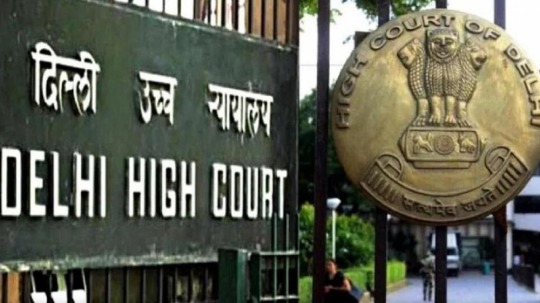
View On WordPress
#Advocate Jai Anant Dehadrai#Delhi High Court#filed against Trinamool Congress leader Mahua Moitra#withdrawn the defamation petition
0 notes
Text
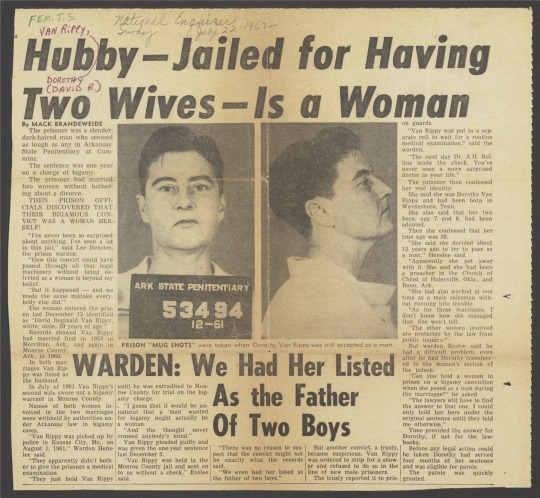


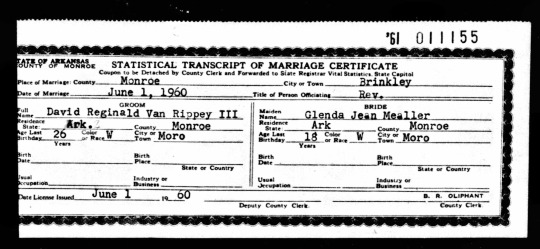
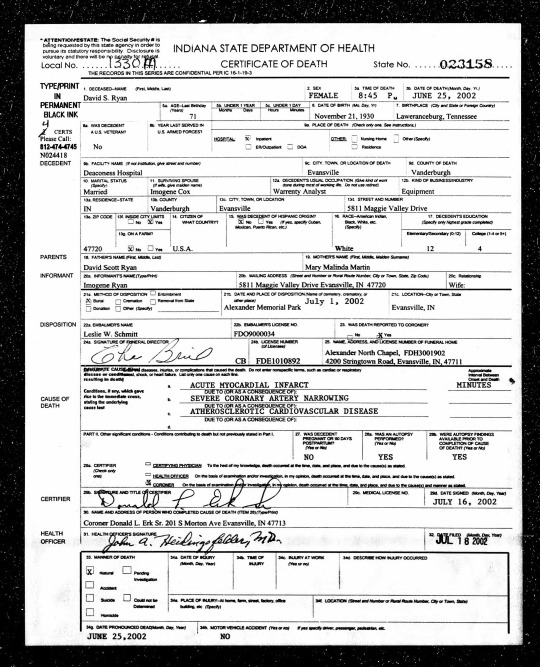

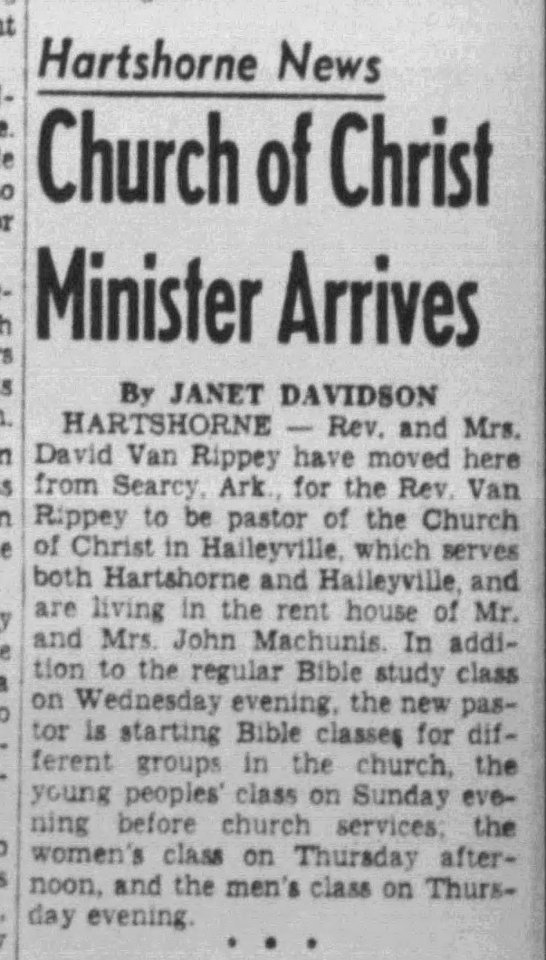

Tennessean trans man David Scott Ryan III transitioned in 1949, around age 26. He became a pastor in 1955 while passing as cis and preached throughout Arkansas and Oklahoma for years. Narratives like David's narratives don't often end well, but David successfully fought to live as a man! Here's his story:
Born in rural Oklahoma on 9/22/1923, David privately transitioned in 1949 before marrying his first known wife, chaplain Margie. He then married another woman named Gwyn after leaving Margie in 1953. He later married a third wife, Glenda, in 1960.
David was outed after his 1961 bigamy arrest. It's unclear if his bigamy was accidental or even real. Gwyn filed for divorce in March 1960 before he married Glenda in June, but documents do not show if the divorce was completed. Glenda filed the bigamy complaint herself for unknown reasons. Was it jealousy? Was David outed? Was she feeling neglected? Glenda did not speak with reporters.
David was far from the first trans man arrested for marrying a woman. Yet, the courts did not know what to do with him. The judge dismissed his case after 4 months of jail and he stayed out of the news for a decade.
There are countless cases like David Ryan in the mid-20th century- trans people who make the news for a few weeks before fading into history. However, thanks to new archive technology, we can trace David's story further. He re-married a woman named May Louise and they divorced in 1971. He then married for a 5th and final time to high school teacher Imogene Cox in 1975. He took up jobs at a construction equipment site and Walmart in Evansville, Indiana over the following decades.
David passed in 2002 from heart disease at age 78. The mortician must have insisted on using an "F" for David despite "M" appearing on his other documents (why?). Local news reported that David loved to play instruments and paint. 50 years after transitioning, he still worked with the church.
3K notes
·
View notes
Text
0 notes
Text
Dc x Dp Prompt #10: Inter-Dimensional Bake-Off
Alfred was checking the mail the manor had received that day when he found it. In between bills, fan mail, and company missives was a regal purple envelope addressed to one Alfred Thaddeus Crane Pennyworth. Intrigued, Alfred set aside the rest of the mail and sat to open the letter.
Inside was a high quality cardstock invitation of a metallic silver color decorated with luxurious midnight green script. It declared on the front:
“You Are Cordially Invited”
Alfred raised an eyebrow and flipped open card.
Dear, Alfred Thaddeus Crane Pennyworth
You have been cordially invited to participate in the first annual inter-dimensional bake-off to celebrate the coronation of the young, King Phantom, age 21, Ruler of the Infinite Realms, the Great One, Protector of Souls, Keeper of Peace, The Perfect Balance, The Infinite King, Ancient of Space and Reality.
We have discerned that you are among the top 25 bakers in the 11 most stable and prominent dimensions with an open connection to the Infinite Realms. Thus, we would like to offer you the opportunity to show off and test your skills against talented competitors.
Should you accept, all transport, accommodation, amenities, materials, and potentially needed medical care shall be provided by the King and his court. If you would like to bring any specific ingredients or tools you are welcome to file a request for them when you arrive and they shall be summoned to you at the start of the competition. You are allowed one plus one either as an assistant or moral support.
Should you have any questions please write them down and place them on the sigil on the next page and recite the incantation bellow:
“bonvolu respondi mian demandon”
The event shall occur in a fortnight upon the weekend before the kings official coronation ceremony. In order to confirm your participation in the competition please burn this letter with one of your most recently made baked goods. In order to decline simply dissolve this message under running water. Please confirm your attendance or absence within a week’s time.
Kind Regards,
the Council of Ancients
Advisors to the Good King Phantom
Well, it seemed like Alfred had earned a place in a rather prestigious event. ‘It seems a finally have a reason to make use of all those vacation days Master Bruce keeps insisting I must utilize.’ He smiled to himself, tucking the letter into his pocket. ‘I wonder if Master Jason would be amicable to accompanying me for a weekend of baking in a magical dimension?’
~
Just in case anyone has trouble reading the letter:
Dear, Alfred Thaddeus Crane Pennyworth
You have been cordially invited to participate in the first annual inter-dimensional bake-off to celebrate the coronation of the young, King Phantom, age 21, Ruler of the Infinite Realms, the Great One, Protector of Souls, Keeper of Peace, The Perfect Balance, The Infinite King, Ancient of Space and Reality.
We have discerned that you are among the top 25 bakers in the 11 most stable and prominent dimensions with an open connection to the Infinite Realms. Thus, we would like to offer you the opportunity to show off and test your skills against talented competitors.
Should you accept, all transport, accommodation, amenities, materials, and any potentially needed medical care shall be provided by the King and his court. If you would like to bring any specific ingredients or tools you are welcome to file a request for them when you arrive and they shall be summoned to you at the start of the competition. You are allowed one plus one either as an assistant or moral support.
Should you have any questions please write them down and place them on the sigil on the next page and recite the incantation bellow:
“bonvolu respondi mian demandon”
The event shall occur in a fortnight upon the weekend before the kings official coronation ceremony. In order to confirm your participation in the competition please burn this letter with one of your most recently made baked goods. In order to decline simply dissolve this message under running water. Please confirm your attendance or absence within a week’s time.
Kind Regards,
the Council of Ancients
Advisors to the Good King Phantom
The Esperanto translates to “please answer my question"
Edit: now with possible contestants
#long post#dc x dp#alfred pennyworth#jason todd#danny phantom#interdimensional bake-off#to celebrate Danny’s coronation#ghost king danny#alfred is a good baker#this spawned from the idea that Alfred should have a cook off with the Lunch Lady#potential dead on main#but not 100% necessary#Strega’s dc x dp prompt
2K notes
·
View notes
Text
The headline is pretty awful but this is one of those things that gets worse as you read it:
The 14-page petition, filed in Shelby County, Tennessee, probate court, alleges that Sean and Leigh Anne Tuohy, who took Oher into their home as a high school student, never adopted him. Instead, less than three months after Oher turned 18 in 2004, the petition says, the couple tricked him into signing a document making them his conservators, which gave them legal authority to make business deals in his name.
"Michael Oher discovered this lie to his chagrin and embarrassment in February of 2023, when he learned that the Conservatorship to which he consented on the basis that doing so would make him a member of the Tuohy family, in fact provided him no familial relationship with the Tuohys."
Oher was a rising high school senior when he signed the conservatorship papers, and he has written that the Tuohys told him that there was essentially no difference between adoption and conservatorship. "They explained to me that it means pretty much the exact same thing as 'adoptive parents,' but that the laws were just written in a way that took my age into account," Oher wrote in his 2011 best-selling memoir "I Beat the Odds."
But there are some important legal distinctions. If Oher had been adopted by the Tuohys, he would have been a legal member of their family, and he would have retained power to handle his own financial affairs. Under the conservatorship, Oher surrendered that authority to the Tuohys, even though he was a legal adult with no known physical or psychological disabilities.
While the [movie] deal allowed the Tuohys to profit from the film, the petition alleges, a separate 2007 contract purportedly signed by Oher appears to "give away" to 20th Century Fox Studios the life rights to his story "without any payment whatsoever." The filing says Oher has no recollection of signing that contract, and even if he did, no one explained its implications to him.
The [movie] deal lists all four Tuohy family members as having the same representative at Creative Artists Agency, the petition says. But Oher's agent, who would receive movie contract and payment notices, is listed as Debra Branan, a close family friend of the Tuohys and the same lawyer who filed the 2004 conservatorship petition, the petition alleges. Branan did not return a call to her law office on Monday.
"Mike's relationship with the Tuohy family started to decline when he discovered that he was portrayed in the movie as unintelligent," Stranch said. "Their relationship continued to deteriorate as he learned that he was the only member of the family not receiving royalty checks from the movie, and it was permanently fractured when he realized he wasn't adopted and a part of the family."
For years, Oher has chafed at how "The Blind Side" depicted him, saying it hurt his football career and clouded how people view him. He has said that based on the film, some NFL decision-makers assumed he was mentally slow or lacked leadership skills.
"People look at me, and they take things away from me because of a movie," Oher told ESPN in 2015. "They don't really see the skills and the kind of player I am."
"Beyond the details of the deal, the politics, and the money behind the book and movie, it was the principle of the choices some people made that cut me the deepest."
#original post#the blind side#michael oher#this is one of the worst things i’ve ever read#this movie always was awful but somehow it got worse
5K notes
·
View notes